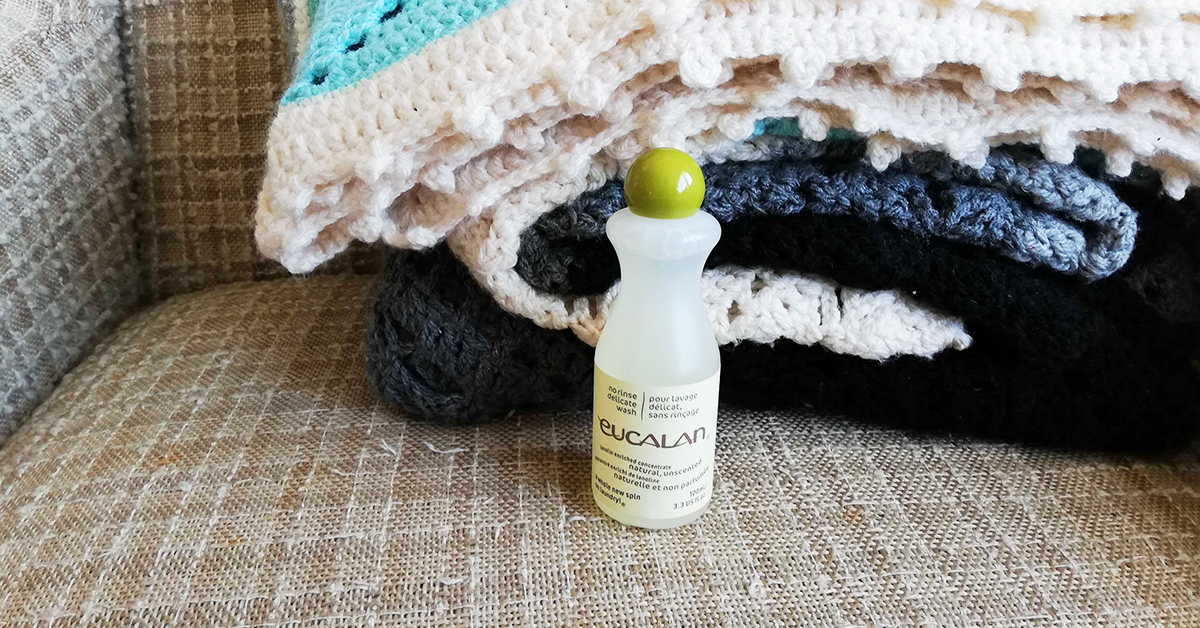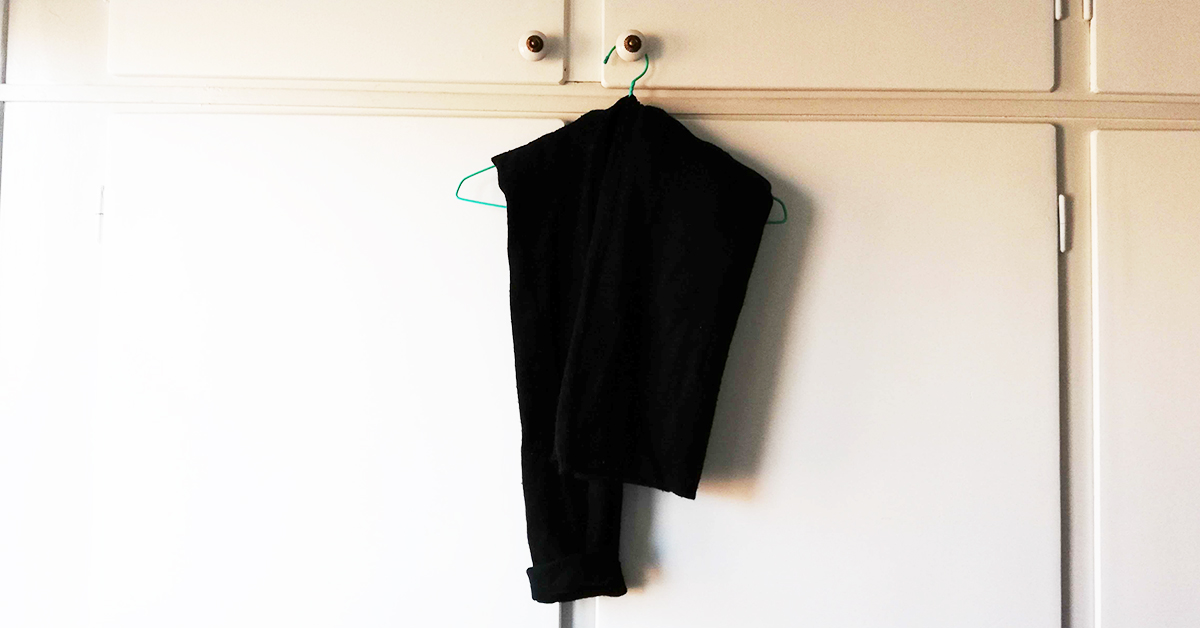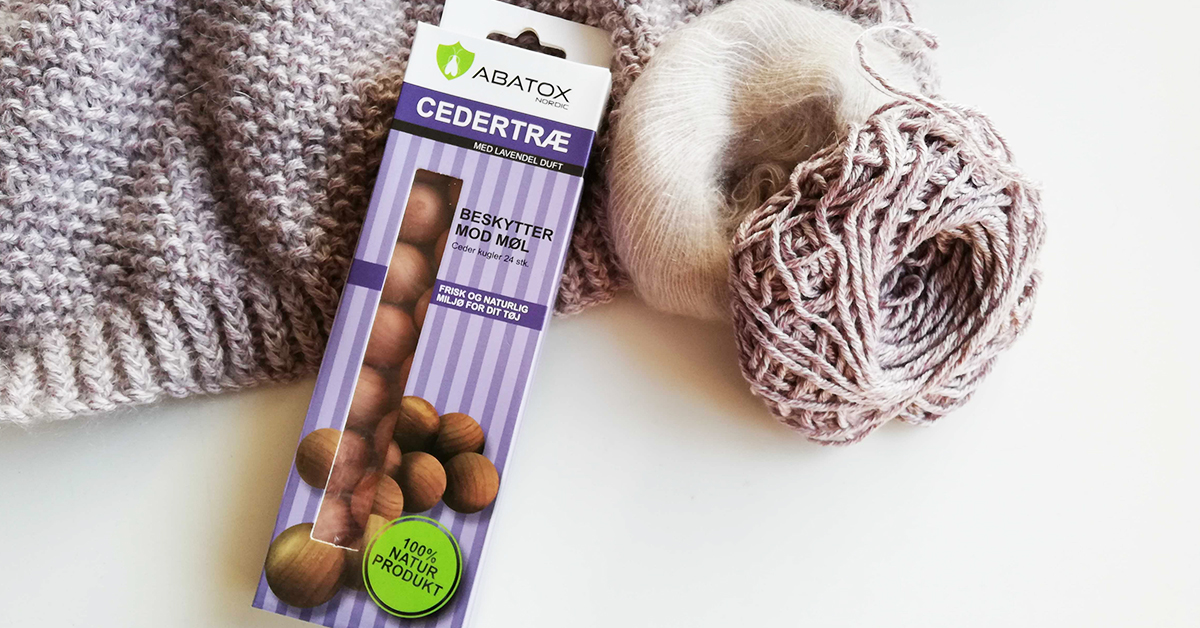Oh, all those pretty things you can make in this world filled with yarn. But how do you really make sure that your great work lasts as long as possible? I will look into that in this blog post so you can enjoy your knitting and crochet for many years to follow.
1. Hand wash is the way to go
Even if it is superwash treated… Yes, I know. That’s not what you wanted to hear. We’re living a busy life with no time for hand washing. Nonetheless it means a great deal if you want to be able to wear your favorite sweater year after year for many years to come. However, I know a couple of super tips to make the hand washing much easier. Nice, eh? 😃
First and foremost, you need a soap that doesn’t require rinsing, because rinsing just makes you want to give up before you've even started. When that’s taken care of, it's time to get started.
Eucalan is a soap with several advantages. You don’t have to rinse, when using it, which in itself saves you a lot of work, but the fact that you don’t have to rinse the garment a bunch of times, helps retain the lanolin in the wool, which keeps moths and other critters away.

Place the garment in lukewarm soapy water (remember the water shouldn’t be warmer than 30°C – rather a bit colder) for 5 minutes, after which the water is poured off and you gently squeeze out excess water. It’s important that you don’t twist the garment, because that will ruin the fibers. After that, put the garment in a laundry bag or pillow case and put it in the washing machine – and now the secret comes.
The washing machine is no good for washing the delicate garment because the movements in the machine will ruin the fibers, but the machine can help you centrifuge the water from the garment for you, so you don’t have to do the hard work. Just set the machine to a centrifuge setting with no more than 800 rotations and voila! The garment is more or less free from water and will dry much faster.
Remember! Always make a swatch in the specific yarn and give it a spin cycle in the machine before you give your project a go, so you are sure that the fabric can withstand the treatment. Washing machines can be very different and unfortunately, not all machines have a spin cycle without water.
2. Dry your garment lying flat
Believe it or not, but it makes a huge difference drying your garment lying flat. Unfortunately, the water can help pull your garment out of shape if you hang it on a clothes line and that would just be such a shame. Instead, place the garment on a big towel, pull it into shape and leave it ‘til the next day.
When you dry flat it’s also possible to block your work at the same time. By this, I mean stretch it into shape. This works wonders on for ex blouses, shawls and blankets with lace work that tightens during wash. When you block your work, the pattern really comes to its own and becomes even more beautiful to watch.
I just bought these practical matts for blocking. They are made so you can put them together in just the shape you need and they’re easy to put away.
3. Wash less
A lot of washing tends to wear on clothes and since many sweaters aren’t worn directly on the skin, you actually don’t have to wash them as often as some might think. Instead, you can air the sweater if you want to freshen it up a little and if there’s no stains on it, you can actually save a wash by putting the sweater in a plastic bag and placing it in the freezer for about a day.
This doesn’t only save your clothes of wear but also, it saves the environment a large water discharge.
4. Avoid hanging your sweaters
It looks so good when the sweaters hang there in a row in the closet, but unfortunately it isn’t good for the garments because the weight of the sweater, in time, will shape them after the hangers. Rather fold them nicely and keep them in a drawer or on the shelves in the cabinet.
If you do want them on a hanger, you can fold them shoulder to shoulder and drape them over the hanger – that way you will avoid the ugly “shoulders” the hanger can leave.

5. Avoid that your beloved sweater lints
Lint occurs with wear. It’s especially seen where the material rubs together, for exampel in the armpit and on the sides where the arms moves back and forth and where you might have a bag.
Fortunately, you can get at this by getting a wool shaver. You could almost call a wool shaver a little razor for the clothes and it is indispensable in any wardrobe. By removing the lint when it occurs, you avoid that they will turn into big, ugly knots and thereby you prolong your favorite sweater’s life.
6. Send the woolly sweaters well away on summer vacation
When the winter is drawing to a close and the higher temperatures sneak out, it is time for the pretty sweaters to be packed away to make room for summer tops and skirts. When this happens, it’s important to pack the winter clothes properly away for the summer.
First of all, it’s important that the clothes are all clean when they’re packed away. Invisible crumbs and bacteria are a feast for moths and can therefore over time attract all the wrong visitors.
Cedar wood, as most people surely knows, is certainly not the moths’ favorite dish, but if you don’t have a closet or a chest of cedar wood, you can pack cedar balls with the clothes that go on holiday in the attic or in the basement. That way, you can be sure the clothes are moth free when the fall arrives.

It’s also a good idea to pack some small linen bags with lavender with the clothes. That way you avoid that the garments get that musty smell.
Last, but not least, it’s important that you make sure that the winter clothes are stored in a dry place to keep it from getting moldy - not in direct sun light though, since this can make the colors fade.
I hope these tips has given you some great ideas for what to do to make sure your knitting and crochet lasts as long as possible. I, for one, learnt a lot of useful things by researching the topic 😊
If you have any pointers, you think I have forgotten, please let me know in the comment section ❤️️
Love,
Eva from Hobbii



